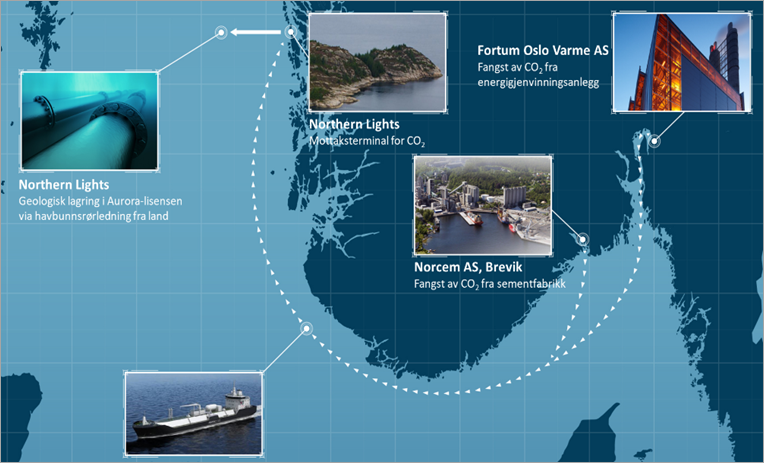Project “Longship”, announced in a government white paper, will mark the world’s first implementation of a full-scale CCS programme

Lockdown measures led to a record decrease in UK emissions in 2020 of 13% from the previous year (Credit: Wikimedia Commons/Monkeyboy0076)
Norway has launched a “milestone” carbon capture and storage project (CCS) in a bid to help the country meet its climate ambitions.
Project “Longship”, announced in a government white paper today (21 September), will mark the world’s first implementation of a full-scale CCS programme.
There will be about $1.8bn worth of public funding put forward for the $2.7bn initiative, which the government claims will lead to emission cuts, help the development of a new technology and create jobs.
It has proposed to first implement carbon capture at Norwegian manufacturer Norcem’s cement factory in Brevik.
The government also plans to fund clean energy company Fortum Oslo Varme’s waste incineration facility in Oslo, if the project secures sufficient funding of its own as well as cash from the “EU or other sources”.
Prime Minister Erna Solberg described the project as a “milestone” in the country’s industry and climate efforts.
“For Longship to be a successful climate project for the future, other countries also have to start using this technology,” she added.
“This is one of the reasons why our funding is conditional on others contributing financially as well.”
Longship is the ‘greatest climate project’ in Norwegian history
For many years, the Norwegian governments have supported technology development, test and pilot projects, and underscored the importance of CCS – which involves removing CO2 from the atmosphere and depositing it in storage sites – as an integral climate tool internationally.
The current government said it has followed up on the work of previous administrations and made targeted efforts on CCS since 2013.

Tina Bru, Minister of Petroleum and Energy, said that “building bit by bit in collaboration with the industry” has been important to the government to be “confident that the project is feasible”.
She added: “This approach has worked well, and we now have a decision basis. Longship involves building new infrastructure, and we are preparing the ground for connecting other carbon capture facilities to a carbon storage facility in Norway.
“This approach is a climate policy that works. Longship is the greatest climate project in Norwegian industry ever. We will cut emissions, not progress.”
Carbon capture and storage key to meeting climate targets
According to the UN’s Intergovernmental Panel on Climate Change (IPCC), CCS will be necessary to reduce global greenhouse gas emissions to meet the world’s climate targets at the lowest possible cost.
It added that if CCS is to become an efficient climate policy instrument, new facilities “must be established in Europe and globally”.
Norway has committed itself to cutting domestic emissions by 50% to 55% by 2030 and emerging technologies will be important in reaching that target.
Sveinung Rotevatn, Minister of Climate and Environment, said for the world to achieve the goals laid out in the Paris Agreement – which aims to cap the rise in global temperatures at “well below” 2C – large-scale CCS is needed.
He added: “Not all emissions can be cut by applying renewable energy. In several industrial processes, such as production of cement, CCS is the only technology that can cut emissions.
“With Longship, Norway will support development of climate solutions for the future.”
‘Ambitious development of climate policies’ in Europe is needed to aid Longship
The government said the project does also involve risk, though, as an “ambitious development of climate policies” in Europe is needed for Longship to have the “desired effect”.
It added that the risks are primarily connected to the economy of the project, such as the technical integration of the different parts of the project, the scope of following projects and necessary support schemes for such projects from the EU and individual countries.
Longship also comprises funding for the transport and storage project Northern Lights, a joint venture between oil majors Equinor, Shell and Total.
Northern Lights will transport liquid CO2 from capture facilities to a terminal at Oygarden in Vestland County, where it will be pumped through pipelines to an undersea reservoir.
